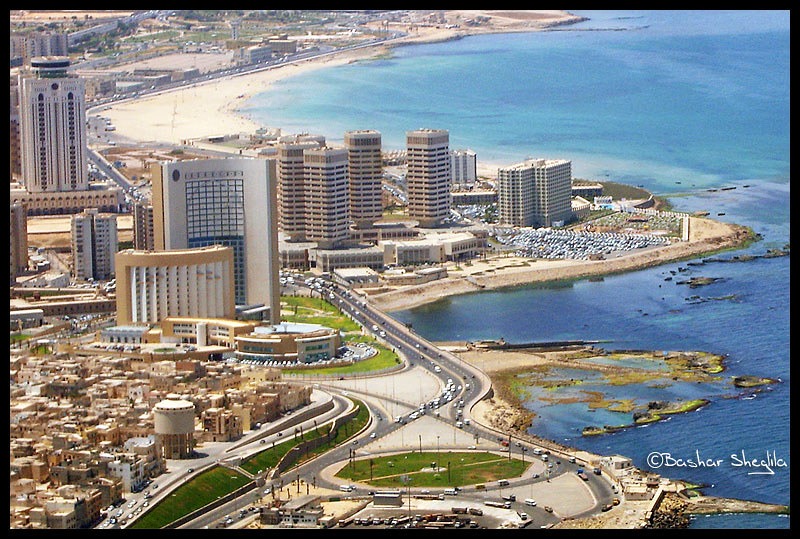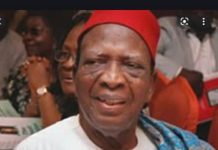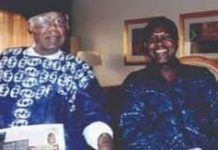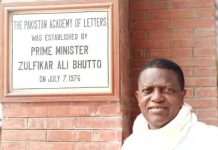As part of celebrations to mark the 8th Anniversary of the creation of the African Union, I was invited alongside other ‘Literary, Political and Cultural Experts’ by the Libyan General council for Culture to take part in a symposium in the historical city of Sirte, the administrative capital of Libya as well as the birth place of Libyan mercurial leader, Muammar El Ghaddafi.
Tagged: ‘From the organization of African Unity to the African Union’, the symposium took place at the same Ouagadougou Conference Halls Complex venue of the inauguration of the African Union eight years earlier.
As the Afrigiyah Aircraft from Lagos taxied to a halt at the modest Ma’atiga airport in Tripoli that early September morning. I was met with a barrage of Arabic inscriptions everywhere.
For a few moments, communication became difficult since very few Libyans spoke English. Fortunately, the Libyan government officials who had come to receive the conference delegates at the airport came to my rescue and I was soon whisked away to the glittering Hotel Kabir in downtown Tripoli.
As a first time visitor to Tripoli, I was stunned by the beauty of the sea port. Beautiful, clean, well-paved roads interspersed high rise accommodation apartments for the citizens as well as magnificent public buildings all in the shade of picturesque date palm trees.
Everywhere was adored with the green and white Libyan flag while “The thinker” “The Leader” Muammar Ghaddafi, smiled broadly from a thousand and one colored posters on both sides of the road. I was later informed that the country had just completed the celebration of the 38th anniversary of the September 1, 1969 revolution which brought Ghaddafi to power and so, the public decorations.
Previously described by the Western Media as “the Bad Boy of the Middle East” ‘A farcical and comical character’ “A dangerous ruler’ and one of the most, wily, most despotic rulers in the modern world. Ghaddafi after his historical 2003 reconciliation with his arch enemies, the US and UK, is still being referred to by a section of the western press as a repentant rogue’ and a terrorist in the guise of an ideological liberator.
The reason for the deep-seated suspicion of the Libyan strongman started in 1979 when the United States Embassy in Tripoli was set ablaze by a Libyan mob and diplomatic relations between Libyan and the United States came to an abrupt halt.
In 1988, Ghaddafi was again incriminated in an act of terrorism when Flight No. 103 was blown up over Lockerbie, Scotland with the death of over 200 people mostly Americans. Ghaddafi later assumed responsibility for the Lockerbie incident by paying a settlement of about $2.7 billion.
In 2003 when Libya decided to abandon its Weapons of Mass Destruction Program, the United States decided to lift the 10- year economic embargo against the country. Ghaddafi’s decision to modify his hostile relationship with the West has now improved trade activities and made Libya one of the Arab world (MENA).
With cash flow booming as a result of high oil prices, economic sanctions lifted and influx of international oil compound, Libya has been described as one of the most stable countries and the most economically progressive in the Middle East and North Africa.
According to a recent report of Business Monitor International (BMI) Libya was rated as the third best out of 16 states including in the MENA region. With the Libyan Dinar exchanging at 1.2 to one US dollar, it is obvious that the country’s greatest asset is its economic strength.
As the conference delegates were driven to the city of Sirte about 700 kilometers from Tripoli, it was obvious that extensive physical development had come to Libya.
Apart from the well paved roads, all the villages and cities had adequate water and electricity supplies. Beyond the well-paved roads, one could glimpse and endless stretch of the Sahara desert with numerous camels dotting the landscape as far as the eye could see. At areas where the over 2,000 kilometers long coastline was close to the land picnickers could be seen enjoying the serenity of the Mediterranean sea which formed the country’s northern border.
However, if Libya is well developed, it still has a lot of challenges due especially to the fact that 70 percent of the country is desert land. Thus, the need to get water to irrigate the land and have enough for the six million citizens led to the Great Man-Made River Project. The project which is reputed to cost Libya about $20 billion successfully brought water from the bottom of the desert to every Libyan home. Another challenge is the intellectual development of the people.
A closed society with little or no relationship with the outside world. Less than five percent of Libyans can communicate in any other language apart from Arabic. It is also difficult to have access to any foreign newspaper, radio station or television station. As one Libya writer put it ‘I am so cut off from the outside world that I feel like a prisoner in my own country”.
And while Liyba’s social, medical and educational programs are free for Libyans, it is believed that majority of rural dwellers in the country are illiterates. Equally distressing is the fact that social benefits paid to unemployed Libyans have been abused with many young males becoming indolent or refusing to work at jobs considered beneath them.
However, one thing you can’t take away from Ghaddafi is his deep seated passion about the formation of the United States of Africa (USA). This became evident when we entered the palatial edifice of the Ouagadougou Conference Complex in Sirte. Situated on a large expanse of land big enough for two soccer stadia, the complex with its array of conference Halls and Guest Houses was meant to be the Headquarters of the proposed United States of Africa (USA).
And as the conference began, it soon became obvious that the proposed USA would be the main thrust of discourse as speaker after speaker harped on the urgent need for the coming together of African countries under one umbrella. Apart from enumerating some of the advantages of the proposed union, obstacles to the idea as well as possible solutions were proffered.
As we filled into the cavernous interior of the Conference Hall, the delegates were issued with copies of the Green Book, a compilation of the thoughts of the “Leader” on Governance and Democracy. A certain section of the book was inscribed at the entrance to the hall. “Africa does not know political parties. We are tribes, we are closer to the masses systems; the people’s Jamahiriya system. We are closer to the people’s congress and the people’s committees. That is what suits us better more than political parties. Our people do not know political parties. They do not even know election”.
And even though Ghaddafi could not attend the conference due to what officials refer to as pressing national issues, he still maintained a larger than life appearance at the confab.
Apart from the fact that delegates had to clap each time his name was mentioned during speeches, we had to keep standing while a letter of congratulation from the delegates was read to him by video! High sounding phrases such as “Our father’ “The Leader’ “The great African fighter” “Knight of the African faith” rang through the Hall during the rendition of speeches.
As the final communiqué was read, it became obvious that the powerfully afro centric document would draw the ilk of leaders of the western world especially the statement; ‘delegates unanimously adopted the Green Book as a model for democracy and governance in the proposed United States of Africa’.
However, even though the idea of a lingua franca for Africa was well received by conference delegates, the decision of the conference organizers to release all conference proceedings in Arabic, a language which speaker after speaker suggested should be the official language of the proposed USA took some delegates by surprise.
It is hoped that spirit behind the formation of a united African state as proposed by Ghaddafi will be rekindled and ultimately implemented for the sake of the continent.















